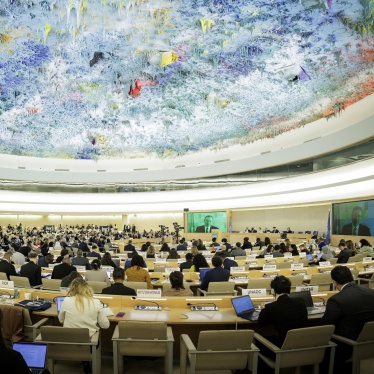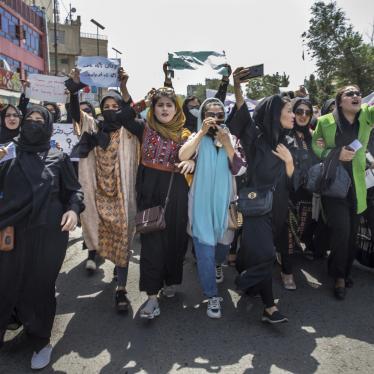House Foreign Affairs Committee
Tom Lantos Human Rights Commission
Hearing on Women and Girls in Afghanistan
Tuesday, July 30, 2024, 2:00 PM
H-313, The Capitol
Statement of Heather Barr
Associate Women’s Rights Director, Human Rights Watch
Good afternoon, Representative McGovern and Representative Smith.
Thank you for holding a hearing on this important and increasingly despairing topic.
Human Rights Watch is an international nongovernmental organization working in some 100 countries, documenting human rights violations and making recommendations to address them. Our researchers work to an established, proven, and consistent methodology based on a broad range of sources including information gathered from direct interviews, field-based documentation, and verification of social media and geospatial information. To ensure our independence, we do not take funding from any government. We have worked on human rights issues in Afghanistan since the 1980s.
I joined Human Rights Watch in 2011 as the Afghanistan researcher and now work for the organization’s Women’s Rights Division. I lived in Afghanistan from 2007 to 2013, working first for the United Nations and then Human Rights Watch. I have continued to follow the women’s rights situation very closely and have visited the country regularly in the past decade, although it has not been possible, for security reasons, for us to visit the country since the Taliban takeover in 2021.
August 15 will mark three years since the Taliban took control of Afghanistan. During these years they have systematically stripped women and girls of their rights and created the world’s most serious women’s rights crisis. Under the Taliban, Afghanistan is the only country on the planet where girls are banned from studying beyond the 6th grade. The Taliban are violating the rights of women and girls including to education, many forms of paid employment, freedom of movement, freedom of speech and association, participation in public life, and even from playing sports or walking in the park. They have tortured women who oppose them and announced plans to stone women to death for adultery.
The crisis is steadily deepening. The Taliban not only continue to issue new abusive orders but are also steadily intensifying enforcement of existing ones. Human Rights Watch has documented the arbitrary detention and torture of women’s rights activists and their families, the devastating harm done to girls who are being denied education and to teachers who have been dismissed from their jobs, and the ways in which barriers to women’s free movement are impairing all of their other rights, from the right to live free from violence to the right to access medical care.
The United Nations special rapporteur on the human rights situation in Afghanistan has called the situation “gender apartheid” and Afghan women’s rights defenders have rallied around an effort to have gender apartheid recognized as a crime under international law.
The international response to this crisis has been—let me not mince words here—shockingly bad. We have seen a lack of coordinated action from governments, and little action beyond statements of concern. Diplomats from numerous countries promise that they consistently raise women’s rights issues in their meetings with Taliban officials, but we can all see now, three years later, that private interventions and public statements unsupported by action have had no meaningful impact in pressing the Taliban to curtail, let alone end, these abuses.
We were especially dismayed by the decision of the United Nations to convene the third meeting of the “Doha process,” a high-level meeting of representatives and special envoys on Afghanistan from 25 countries with the Taliban in June 2024, that excluded Afghan women from the meeting and did not include women’s rights on the agenda. This decision handed the Taliban an enormous victory at great cost to women that will endure long past the meeting.
The UN gave in to Taliban demands that they be treated as representatives of Afghanistan who were not obliged to answer for their systematic violations of women’s and girls’ rights. It betrayed Afghan women who are risking their lives to fight for their rights and could set a precedent that – until reversed – will remain deeply harmful to the struggle for women’s rights in Afghanistan. While the Doha process is the main effort by the UN and special envoys to respond to the terrible situation inside the country, Human Rights Watch and Afghan human rights defenders are concerned that this process is strengthening the Taliban’s claims to legitimacy and conveying that the Afghan human rights crisis is not a global priority.
As an organization that works on women’s rights around the world, Human Rights Watch believes that the woefully ineffectual international response to Afghanistan also has major harmful implications for women’s rights globally. Bad actors abroad who share the Taliban’s worldview will be emboldened because of the inadequate international response to this grave women’s rights crisis.
The United States government is a major actor in this situation and can do much more than it has. We are very aware of how politicized this situation has become both on an international level, in spaces like the UN Security Council and Human Rights Council, and at the US domestic level. We understand that competing foreign policy interests and national concerns such as security, American hostages, and counter-narcotics affect US engagement on Afghanistan. In fact, it is because the US has multiple interests in Afghanistan and with the Taliban that the US has the leverage and the opportunity to positively affect and even reverse the devastating conditions over half of Afghanistan’s population is facing.
The Taliban urgently need to be held accountable for their abuses and their crimes. The United States should take the following important steps:
- Adopt legislation so that the US Office of the Special Envoy for Afghan Women, Girls, and Human Rights is a permanent, fully funded office;
- Call on the UN and all other stakeholders to comply with UN Security Council resolution 1325 on women, peace and security to ensure that Afghan women are full participants in all discussions about the future of their country;
- Call for the Doha 4 meeting, should it take place, to have a strong human rights focus on the agenda and include Afghan women as full participants;
- Authorize robust support for Afghan human rights defenders inside and outside of the country, and for women and girls’ virtual education programs, external continuous learning opportunities, and other programs that can invest in women and girls’ development and future in innovative, safe and secure ways. Work with other donors to scale-up current successful programs to reach the over one million girls blocked from secondary education;
- Help restore public services including health care, water management, and agriculture in areas where women and girls are disproportionately affected;
- The detailed Priority 2 (P-2) visa category for Afghans persecuted because of their US-affiliation was appropriate for the first several years after the US withdrawal from Afghanistan, but after three years of Taliban rule the P-2 category should be expanded to include women-headed households, including women survivors of domestic abuse; defenders of women’s civil and human rights; female police officers; and women or girls who qualify for education or need medical care but have been denied it because of their gender;
- Express support for the International Criminal Court’s investigation in Afghanistan;
- Endorse and support calls for the creation of a new UN investigative mechanism with a mandate to collect and preserve evidence of and advance accountability for past and ongoing crimes in Afghanistan, including at the UN Human Rights Council’s 57th session in September-October;
- Urge other states, that have ratified the Convention on the Elimination of All Forms of Discrimination Against Women, to bring a case at the International Court of Justice regarding Taliban violations of the convention;
- Publicly support the recommendations of the UN special rapporteur on the human rights situation in Afghanistan, including by considering codifying gender apartheid as a crime against humanity.
Thank you.









